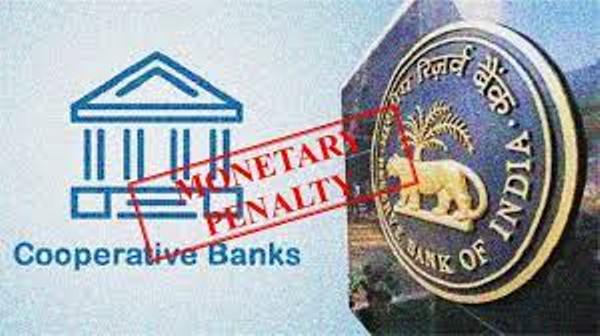RBI imposes monetary penalty on 4 co-operative banks
The Reserve Bank of India (RBI) has imposed monetary penalties on four co-operative banks for deficiencies in regulatory compliance. These banks are Shri Vinayak Sahakari Bank, Shreeji Bhatia Cooperative Bank, Mizoram Urban Cooperative Development Bank and Vita Urban Co-operative Bank.
The Reserve Bank imposed a monetary penalty of Rs. 1.50 lakh on Vita Urban Co-operative Bank Ltd., Vita, Maharashtra (the bank) for contravention of provisions of certain banking norms and directions issued by the apex bank on ‘Maintenance of Deposit Accounts’. The bank had not transferred the eligible amount to Depositor Education and Awareness Fund (DEAF) and had not conducted annual review of inoperative accounts.
The Mizoram Urban Cooperative Development Bank Limited, Aizawl (the bank) was also penalised of Rs. 20,000 on for non-compliance with specific directions issued by the apex bank under Supervisory Action Framework (SAF) and certain provision of ‘RBI’s KYC directions. The bank had granted fresh loans and advances carrying risk weights of more than 100% in violation of specific directions issued under SAF and failed to put in place a system of periodic review of risk categorisation of accounts.
The apex bank further imposed a monetary penalty of Rs. 1.00 lakh on Shreeji Bhatia Cooperative Bank Ltd., Mumbai (the bank) for non-compliance with specific directions issued by RBI under the Supervisory Action Framework (SAF) and RBI’s KYC directions. The bank had incurred capital expenditure without prior approval of RBI in violation of SAF directions and had not conducted periodic review of risk categorization of its existing customers.
The Reserve Bank also imposed a monetary penalty of Rs. 1.50 lakh on Shri Vinayak Sahakari Bank Ltd, Ahmedabad (Gujarat) for contravention of direction issued by RBI on ‘Placement of Deposits with Other Banks by Primary (Urban) Co-operative Banks (UCBs)’. The bank had breached prudential inter-bank (counterparty) exposure limit.
The actions of Reserve Bank was based on deficiencies in regulatory compliance and not intended to pronounce upon the validity of any transaction or agreement entered into by the banks with its customers.




